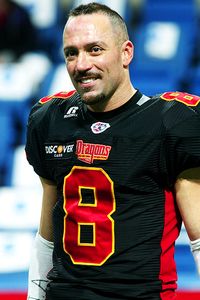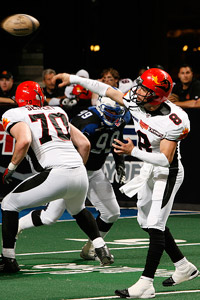Aaron Garcia sees himself in the right place, at the right time
 Mike Stobe/Getty ImagesNew York Dragons quarterback Aaron Garcia's teammates call him Loco Ocho -- Crazy 8 -- for his jersey number and the spirit with which he plays.
Mike Stobe/Getty ImagesNew York Dragons quarterback Aaron Garcia's teammates call him Loco Ocho -- Crazy 8 -- for his jersey number and the spirit with which he plays.In sports, as in life, fame can turn on chance, a lucky break, being in the right place when the stars are perfectly aligned.
Such is the case with Aaron Garcia, the 37-year-old New York Dragons quarterback in the Arena Football League. In a career covering 14 years, Garcia has been one of the most prolific, durable and popular players in league history.
Yet over the years, when Garcia watched an NFL game and saw Alex Smith or David Carr or Rex Grossman throw three interceptions, he couldn't help but think, "What if?"
What if after his freshman year at Washington State University, when he led the PAC-10 in passing efficiency, Dennis Erickson, the coach who recruited him, hadn't bolted for the University of Miami?
What if Erickson hadn't been replaced by Mike Price, who then recruited Drew Bledsoe, a future No. 1 draft pick, sending Garcia first to the bench and then to Sacramento State University, where he finished his college career in relative anonymity?
What if when he finally got his NFL chance, with the San Francisco 49ers, former AFL quarterback Jeff Garcia hadn't already been entrenched as the starting quarterback? Garcia, a fellow Latino, was nearly a clone of Aaron Garcia in his style of play, and apparently one Garcia was enough for 49ers general manager Terry Donahue. So Donahue, a former UCLA coach, signed his former quarterback, Cade McNown, as Jeff Garcia's backup.
Years later, when asked whether the 6-foot-1, 190-pound Aaron Garcia would have made a good NFL quarterback, Erickson, who later coached in the league at Seattle, told a reporter, "His size might have hurt him but so many of the great ones are 6-foot. Given the right chance, he probably would have been a great NFL player."
[+] Enlarge

Mike Stobe/Getty Images"When you think about your heritage, you think about toughness and hard work," Garcia said. "Those are the things I always tried to aspire to in the way I played."
Garcia vividly remembers the comment.
"On one hand, I appreciated it," he said, "because Coach Erickson is someone that I always respected from the first day I met him. That's why I went to Washington State. But the other thing is, he's telling me something I've always known, so I have mixed emotions. There are times when I'm watching an NFL quarterback struggling to get through the game, and I get bitter to some extent."
Nevertheless, Garcia is not one to sit around and mope or dwell on the past, as his success in the AFL has proved. His stats are stellar -- one of four players to throw more than 800 touchdown passes, and for his career he has a 62.4 percent career completion percentage and a quarterback rating of 116.
"I've been fortunate and blessed to further my career in the Arena Football League, and I've had a good time doing it," he said in a recent telephone interview from his offseason home in Sacramento, Calif.
And, really, for Garcia, as it is with most athletes, it's all about playing the game as long as you can, whether it's sandlot football, the arena league or the NFL.
His father, Hank Garcia, who helped coach his son's team when Aaron starred at Sacramento's Grant High School, recalls a kid who always threw on the sidelines during games -- something he still does.
"He just loved to throw the football," said Hank Garcia, who starred as a three-sport athlete at Grant and earned a baseball scholarship to the University of New Mexico.
The father saw something else in his son that told him he had a bright future in sports.
"He was coachable," he said. "He liked the game, whatever it was, and he had a desire to learn more about it."
[+] Enlarge

James D. Smith/Getty ImagesGarcia says he'll return next season in the hopes of winning a championship.
At Grant, Aaron Garcia broke all of John Elway's state records and headed off to Washington State assuming he would dominate the Pac-10 and, afterwards, play on Sundays.
The debacle that followed, sending him home to Sacramento, was the first setback he had faced in a life that, to that point, had been clear sailing. Dealing with it was seriously harder than, say, hitting a wide receiver cutting across the middle with a 350-pound lineman bearing down on him.
"A part of me wanted to quit," he said. "I kind of felt like I failed.
He considered getting his degree -- a top priority -- and moving on with his life. But he couldn't see himself not playing the game. He loved it too much.
Also, there was the matter of his considerable family. Hank Garcia's parents emigrated from Mexico -- his wife is of German heritage -- and between them they had 20 siblings. Most of them lived in the Sacramento area, so the cousins network was vast.
They wanted to watch Aaron play.
So he did.
At Sacramento State, Garcia played well but not spectacularly. In the first of many subsequent injuries, he tore up his knee his senior year. Not surprisingly, he wasn't drafted. He took a year off for rehab and then headed to the AFL. Erickson, with whom he had stayed in touch, told him to get a few good seasons under his belt and then take a shot at the NFL, a path followed by Jeff Garcia and, later, Kurt Warner.
In 1995, playing for the Arizona Rattlers, Aaron Garcia led the league in passing. But near the end of the season he broke two bones in his lower back. After more rehab he bounced around the league for a few years before landing with the Iowa Barnstormers in 1998. There he gradually became one of the best players in the league, going from 43 touchdown passes his first year to 104 TDs and a 122.6 rating four years later, when the team moved to New York and became the Dragons.
Garcia has become as notable for the injuries he has endured as his stellar play. Ask him which bones he has broken and he starts from the bottom -- a broken foot -- and works his way up. Both knees have been surgically repaired. In the worst incident, in 2006, he fractured his ankle, his tibia and his fibula. As a result, his right leg, containing two plates and 18 screws, would light up any airport security system. Even Garcia thought he was finished after that injury. But after a few months of rehab he finally was able to outrun his three kids, then aged 4, 5 and 9. One goal accomplished. After that his competitive spirit kicked in and there was little doubt he would suit up in 2007.
Garcia is much admired by his teammates, past and present. They call him Loco Ocho [Crazy 8] for his jersey number and the spirit with which he plays the game.
"I would say the biggest accolade is his leadership through his play," said Dragons coach, Weylan Harding. "When you have a quarterback that is tough it's hard for the other people on the team not to kick in."
Garcia has made a lot of friends in the game. One of them, Mike Perez, played quarterback at San Jose State and later shined in the early days of the AFL. Garcia followed Perez's career, beginning when he was at Grant High, in part because they shared a common ethnicity and because so few Latinos played football.
"When you think about your heritage, you think about toughness and hard work," Garcia said. "Those are the things I always tried to aspire to in the way I played. That's something that Mike did. When I graduated from college I didn't want to play in the AFL. I watched Mike play and saw his success. That helped me get into the league."
Ironically, Garcia ended up breaking Perez's AFL records.
"It was an honor," he said.
"I feel the same," said Perez, who was briefly with the New York Giants but never played. "Aaron is a great player, a tough player, a well-respected player. He could have been playing in the NFL."
Garcia says he'll be back for the 2009 AFL season, pursing the one thing that has eluded him: a championship. This year, the Dragons were one play away from making it to the Arena Bowl with 10 first-year players.
"He'll work like a dog to try and make that happen. I think this will be his best shot," Harding said.
Said Garcia: "You have to be in the right place at the right time. The only thing I can do is continue to work hard and help my teammates do the same."
Retirement isn't yet on his radar. When he does retire, with his leadership skills and passion for sports, he'll likely stay close to the game. And yes, despite all his success, Garcia will always wonder, "What if?"
"The one thing I'll regret is not having that one opportunity to go out there and prove one way or another [that I belong]," he said. "If I went out there and didn't do well, that's fine. You could say I wasn't good enough. But there have been so many scouts and coaches that never gave me that opportunity to even show what I could do."

No comments:
Post a Comment